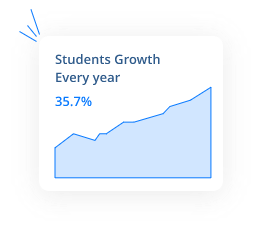Study in Canada
Experience a World-Class Education!



Study in Canada
In recent years, Canada has witnessed a remarkable surge in Bangladeshi student enrollment, with over 3,800 securing study permits in 2023 alone. This trend closely mirrors the overall growth of international student enrollment in Canada, which reached a record 807,750 in 2021, with higher education accounting for 621,565. This rise parallels a broader trend: Canada’s welcoming embrace of international students, evident in its top-3 ranking for quality of life by U.S. News & World Report and its 7 prestigious universities within the Times Higher Education’s top 200 for 2023.
But what explains this particular appeal for Bangladeshi students? The answer lies in a potent mix of factors. Canada’s reputation as a safe, friendly, and multicultural society resonates deeply, offering a supportive environment for young Bangladeshis embarking on their academic journeys. This, coupled with its world-class educational institutions and thriving job market, creates a perfect storm of opportunity for those seeking a quality education and a bright future.
This is just the beginning of the story. Let’s delve deeper into why Canada is becoming the academic destination of choice for Bangladeshi students and explore the exciting possibilities that await them in this vibrant and welcoming land.

Want to study in Canada? With nearly half a million international students, Canada stands out as a top destination, offering world-class education, affordable tuition fees, and hassle-free visa applications. It offers a superior standard of living, diverse learning environments, quality education, and career opportunities. Canada’s international student population has tripled over the past decade, as many of the prestigious institutions frequently secure top positions in global rankings.
Study in Canada: Key Facts & Statistics
Languages Spoken
Cost of study
Sources of funding
Exams Required
Degrees
Intakes
Visa
Best Student Cities
Top Universities
Cost of Living
Canada is a popular study destination for international students, including those from Bangladesh, due to its high-quality education system, high standard of living, cultural diversity, and affordable tuition costs. To study in Canada, international students must obtain a study permit, which may be Student Direct Stream (SDS) or non-SDS, depending on eligibility. Students also need to meet English proficiency requirements by submitting test scores from exams like IELTS, TOEFL, or PTE. Additionally, graduate school applicants may need to submit GRE, GMAT, or SAT scores.
Three of the world’s top 50 universities are located in Canada, and Canadian institutions are globally recognized for excellent academics, innovative research, and commitment to education. Canadian colleges and universities offer a wide range of programs catering to diverse interests and career aspirations, whether in fields like engineering, arts, business, or others. The high-caliber education, combined with future career prospects and return on investment, makes Canada an appealing choice for Bangladeshi students seeking to study abroad.
Top 12 Benefits of Studying in Canada
The benefits of studying in Canada are:
- World-class education – Canada has some of the top ranked universities globally, with a high quality education system. Students have access to excellent programs and research opportunities.
- Multicultural society – Canada is an extremely diverse and welcoming country, especially in large cities. It’s a great way for students to experience different cultures.
- Potential immigration – After graduating, international students have options like the Post Graduation Work Permit that can help them gain Canadian work experience and improve immigration prospects.
- Safe communities – Canada consistently ranks as one of the safest countries in the world, with stable politics, making it a secure study destination.
- Affordable tuition – Compared to other top study destinations like USA and UK, international tuition fees in Canada can be more affordable. Cost of living is also reasonable.
- Option to work – International students can work part-time on campus and full-time off-campus, allowing them to gain experience and earn income.
- Pathway programs – Canadian colleges and universities offer pathway programs like university transfer and 2+2 degrees as an alternate route for international students.
- Ease of getting a study visa – The Canadian student visa process is relatively straightforward compared to other countries. Student success rate is high.
- Scholarship opportunities – Both universities and third-party organizations offer generous scholarships for international students based on merit, need etc.
- Gain an international outlook – With peers from around the world, students can build global connections and have a direct experience of diversity.
- Improve English proficiency – Since the primary language is English, it allows non-native students to hone their language abilities. This is a major asset both education and career wise.
- Gateway to global work or study opportunities – A Canadian degree or diploma is recognized worldwide, and can open doors for students to explore options in other leading study destinations or expanding job markets globally.

Avisha Sanjay Kumar Patel
CANADA
Do you wanna be next?
Education System in Canada
Canada’s affordable yet highly reputable education system draws students worldwide, with international enrollment having grown by 400%. The system comprises elementary, secondary and post-secondary levels. After finishing elementary and secondary schooling around ages 16-18, students can pursue post-secondary education.
While each Canadian province oversees its education administration, credentials are widely recognized globally. Canada offers excellent value, with tuition substantially lower than many countries.
The post-secondary category includes vocational schools, career colleges, technical institutes and universities. Students can enroll in undergraduate or graduate degree programs, professional certifications, diplomas, vocational training and language learning. With quality education and qualifications valued by employers worldwide, Canada continues gaining traction as a preferred study destination.
Qualification
Duration
Certificate
Diploma
Advanced Diploma
Bachelor’s Degree
Post-Graduate Diploma/Cert.
Master’s Degree
Doctorate or Ph.D.
Post-doctoral program
Popular Courses to Study in Canada
With its stellar education system, Canada provides international students with immense choice across certificate, undergraduate, graduate, and post-graduate programs. Offerings span diplomas, Bachelor’s degrees (3-4 years), Associate degrees, Master’s degrees (2 years), Doctoral programs (4-6 years) and 1–2-year post-graduate diplomas.
Canadian institutions emphasize practical, experiential learning where students apply academic concepts in real-world settings. This facilitates deeper understanding and the development of hands-on skills and field experience. The focus on fusing theory with practice equips graduates with well-rounded qualifications that employers value.
From short-term certificates to multi-year doctoral studies, Canada caters to diverse academic and professional goals. The array of high-quality programs combined with practical training continues, making Canada a top global study destination.
The popular courses to study in Canada are:
- Computer Science
- Business
- Engineering
- Health Sciences
- Physiotherapy
- Information Technology
- Animation and Gaming
- Hospitality Management
- International Business Management
- Master of Business Administration
- Architecture
- Culinary Management
- Media & Journalism
- Agriculture Science
Course
Avg. Annual Tuition Fee (CAD $)
Avg. Annual Tuition Fee (BDT)
International Business Management
CAD 15,000 - 25,000
INR 850,000 - 1,415,000
Master of Business Administration
CAD 30,000 - 40,000
INR 1,700,000 - 2,260,000
IT & Computer Science
CAD 20,000 - 40,000
INR 1,130,000 - 2,260,000
Engineering
CAD 30,000 - 50,000
INR 1,700,000 - 2,830,000
Health, Biosciences & Pharmacy
CAD 30,000 - 50,000
INR 1,700,000 - 2,830,000
Media & Journalism
CAD 20,000 - 30,000
INR 1,130,000 - 1,695,000
Top Universities to Study in Canada
Canada’s esteemed universities provide premier facilities – including modern libraries, auditoriums and research hubs – that enable a top-tier academic experience. All universities offer safe, comfortable on-campus housing with dorms, residential halls and apartments.
As of 2024, 31 Canadian institutions rank among the QS World University rankings, with the top 11 securing spots within the prestigious global top 250. The highest-ranked Canadian universities for 2023, along with their positions on QS, Times Higher Education (THE) and U.S. News & World Report global ranking lists are:
The top universities to study in Canada are:
University Name
University Known For
QS World University Ranking 2024 (Globally)
Times Higher Education Ranking 2023 (Globally)
Tuition Fee per year (CAD)
Tuition Fee per year (INR)
University of Toronto
Top research-intense university, innovation-driven
21
18
40,000
24.51 lakhs
McGill University
Renowned for Engineering courses
30
46
27,000
16.54 lakhs
University of British Columbia
Strong in teaching, research, consistent ranking
34
40
34,000
20.83 lakhs
University of Montreal
Largest university complex, prominent research
141
111
17,000
10.41 lakhs
University of Alberta
Top in Engineering, Humanities, Health Sciences, Business
111
118
21,000
12.87 lakhs
University of Waterloo
Leading in Computer Science, Engineering, Science, Math
112
201-250
40,000
24.51 lakhs
Western University
Excellence in education, research, healthcare
114
201-250
23,000
14.09 lakhs
University of Calgary
Strong research, diverse university culture
182
201-250
37,000
22.67 lakhs
McMaster University
Research-intense, notable for nuclear reactor
189
80
45,000
27.57 lakhs
University of Ottawa
Thrives on Excellence, Relevance, and Impact
203
137
30,000
18.38 lakhs
Best Places to Study in Canada
As you consider your university options, examining the top student cities in Canada merits attention. The QS Best Student Cities Rankings for 2024 highlight Toronto, Montreal, Vancouver, Ottawa, and Quebec City as premier destinations to study. Understanding the defining features of these university towns can aid your decision-making. Get to know the popular cities of Canada in brief.
- Toronto: Situated in Ontario, Toronto is home to Canada’s top-ranked University of Toronto. As the largest city, it has a multicultural environment and position as the nation’s financial center with 5 major banks.
- Montreal: Montreal is the second largest city with a vibrant academic climate featuring McGill, the Université de Montréal, and Concordia University.
- Vancouver: The third largest metro area, Vancouver combines an urban setting with outdoor access. Notable universities are the University of British Columbia, Simon Fraser University, and the University of Victoria.
- Ottawa: The capital Ottawa boasts quality universities welcoming international students alongside affordable costs of living with abundant jobs and scholarships.
- Quebec City: A friendly Francophone city, Quebec City promotes cultural immersion through affordable education. It has strong career outcomes for graduates and a low unemployment rate.
How to Study in Canada?
Intakes to Study in Canada
Bangladeshi students aiming for a Canadian education face a unique advantage: multiple university intakes. Unlike Bangladeshi’s standard system, Canadian universities welcome applications through three distinct semesters, known as Fall, Winter, and Summer. This flexibility means finding the perfect study journey just got easier.
The Popular Pick: Fall Intake (September)
The Fall intake, commencing in September, is the most popular choice among international students due to its extensive course offerings and generous scholarship opportunities. This period witnesses the highest volume of applications, attracting students from diverse backgrounds. Be prepared for the highest competition during this season.
Second Chance: Winter Intake (January)
For those who missed the Fall application window, the Winter intake presents a valuable opportunity. While course selection may be slightly limited compared to Fall, career prospects, internships, and scholarships remain readily available. This intake offers a fresh start amidst the winter months.
For Focused Studies: Summer Intake (April/May)
For students with specific vocational or diploma program aspirations, the summer intake, offered by select universities, provides a focused pathway. This period, spanning April and May, allows students to delve into specialized studies during the warmer months.
Finding Your Perfect Fit
Choosing your intake is like charting your academic course. Weigh your priorities: course availability, scholarship options, and personal preferences. Remember, each intake has its own charm and challenges. With thoughtful planning, you’ll navigate the Canadian academic landscape with confidence.
Contact the NIEC Bangladesh team to get the best advice to plan your Canada Journey.
Intake
Program
Admission Deadline
September or Fall
Undergraduate and Postgraduate
December - March
January or Winter
Undergraduate and Postgraduate
September - November
May or Summer or Spring
Diploma
January - February
Canada Student Visa Requirements for International Students
International students who want to study in Canada need a study permit. It is a necessary immigration document that validates their stay in Canada and accompanies a visitor visa or Electronic Travel Authorization (eTA). Alongside the study permit, you need a visitor visa or eTA to enter legally. This permit is essential for Indian students which grants permission to study at Designated Learning Institutions (DLIs) in Canada.
Please note that a study permit is not a visa. A student visa will authorize your entry to Canada. To apply for a Canadian Student Visa, it’s best to start the process 4 to 6 months before your classes begin and after you’ve received an Admission Offer from a Canadian Designated Learning Institute. You can apply online using the Government of Canada Key (GCKey) portal or at a Visa Application Centre (VAC) or directly at the entry port if you prefer. The fee for applying for a Canadian Student Visa is $150 CAD, and it also covers a $85 CAD biometrics fee and a $45 CAD service fee.
The study visa processing time will be around 4 to 8 weeks. If you’re in a hurry, the Student Direct Stream (SDS) option processes it in just 20 days. Indian students are eligible for the SDS category and can apply by submitting the necessary documents for their student visa.
Difference between SDS and Non-SDS
Study Permit Extension
Canada Spouse Visa
Canada Visa Rejection
Canada Visa Interview Questions
What are the documents required to apply for a Canadian study visa?
- Letter of acceptance from a Designated Learning Institution (DLI)
- Valid passport or travel document
- Identity proof authorized by the resident’s government
- Financial statement demonstrating the ability to cover living costs, return air tickets, and fees
- Medical information
- Statement of intent and how you contribute to the resources
- No criminal record certificate
- Canadian bank account
- Guaranteed Investment Certificate (GIC)
- Student or education loan proof
- Bank draft in Canadian dollars
- Proof of payment of Tuition and Housing Fees
- Letter from sponsoring school or individual
- Proof of scholarship
- Attestation of issuance of Quebec Acceptance Certificate (CAQ)
- Letter of explanation/SOP
Documents Required for Studying in Canada for Bangladeshi Students
The documents you need to submit while applying for admission to Canadian universities/colleges are:
- English language proficiency test scores:TOEFL / IELTS / PTE / Duolingo / CAEL
- Standardized test scores –SAT / GRE / GMAT / LSAT
- Letter of Recommendation (LOR)
- Work experience certificate, if any.
- Academic transcripts (school/bachelor’s/master’s degree certificates)
- Statement of Purpose (SOP)
- CV/Resume
- Essay
- Copy of your valid passport
- Proof of finances
Get ready to
Study Abroad
Cost of Studying in Canada
The cost of studying in Canada ranges from CAD 13,000 to CAD 35,000 in a year based on the type of degree and institution. Humanities, education, and arts programs tend to be more affordable, while medicine and engineering are pricier. On average, undergraduate studies cost around CAD 6,800 (Rs. 4,16,582/-) per year, and master’s programs range from CAD 21,100 annually, as per Statistics Canada (2022). Postgraduate studies have higher tuition fees, with MBA programs being the most expensive, approximately between CAD 30,000 and CAD 42,000. Compared to other developed countries, Canada offers more economical education programs and funding opportunities like scholarships, student loans, bursaries, and assistantships to international students.
Check the following table to know the program level and the estimated tuition fee.
S.no
Study Program
Average Annual Fee in Canadian Dollars (CAD)
Average annual Fee in Indian Rupees (INR)
01
Undergraduate Program
$13,000 - $20,000
₹7,00,000 - ₹10,75,000
02
Postgraduate Master's Degree
$17,000 - $25,000
₹9,25,000 - ₹13,50,000
03
Doctoral Degree
$7,000 - $15,000
₹3,75,000 - ₹8,00,000
04
Masters of Business Administration (MBA)
$30,000 - $40,000
₹16,25,000 - ₹21,75,000
05
Foundational Courses
$20,000
₹10,75,000
Scholarships to Study in Canadian Universities
Scholarships are essentially monetary rewards granted to eligible students based on academic excellence, and they don’t require repayment. Meritorious students with strong academic and extracurricular records can apply for these scholarships. These scholarships, provided by both the Canadian government and external organizations, aim to ease the cost of education abroad. Need-based scholarships are also accessible.
Find the list of popular scholarships in Canada for Indian students from the table below.
S.no
Scholarship Name
Description
Amount
01
Banting Postdoctoral Fellowships
Postgraduate scholarships in science and healthcare
$54,219/year (taxable)
02
Vanier Canada Graduate Scholarships
Scholarships for doctoral study
$50,000/year
03
Queen’s University International Scholarships
Scholarships for international students with high grades
$6,969
04
University of Calgary International Entrance Scholarship
Scholarship for international UG applicants
Up to CAD 15,000
05
Canada-ASEAN Scholarships and Educational Exchanges for Development 2021
Scholarships for Bachelor's and Master's
Up to CAD 15,900
06
CGSP Postdoctoral Fellowships 2017
Scholarships for postdoctoral study
$45,000/year
07
Shastri Indo-Canadian Institute
Fellowships at various levels for research and training
Varies
08
Canadian Commonwealth Scholarship and Fellowship Plan
Scholarships for advanced study and research
Varies
09
Ontario Graduate Scholarship Program
Scholarships for graduate students
Varies
10
National Research Council of Canada (NRCC)
Research associateship for Master's and Ph.D. holders
Variable
Education Loan for Studying in Canada
The total expenses for studying in Canada are influenced by factors like the chosen program, university, course duration, and living costs. To assist students who struggle to afford to study and live in Canada, various banks and financial institutions extend education loans for Canada. Before applying for an educational loan, reviewing the eligibility criteria is important to ensure loan approval. Since different loan schemes cover different expenses, it’s advisable to consult the banks to understand the specific expenses and loan schemes that are applicable. Educational loans typically cover various expenses, including.
- Admission fees
- Tuition fees
- Transportation charges
- Books, stationery, and other study materials
- Laboratory fees
- Hostel fees including food
- Purchase of a laptop with the necessary configuration (If required for the course)
- Expenses for project work or study tours
Cost of Living in Canada
The cost of living in Canada ranges from CAD 15,000 to CAD 20,000 per year. There’s a notable contrast in the budget of living in Canada and in one’s home country. That’s why it is essential to understand the lifestyle and the cost of living in Canada. Quebec stands out as an affordable Canadian city with comparatively lower living costs. The cost of living in Canada involves factors like food, housing, clothing, books, transportation, and recreation, with an average of approximately CAD 19,000 (INR 11,62,173). All Canadian residents enjoy free healthcare services, a benefit extended to permanent migrants.
Expenses
Cost in CAD per month
Cost in INR per month
Accommodation
$800 - $2,500
₹42,000 - ₹1,31,000
Utilities (electricity, water)
$50 - $150
₹2,600 - ₹7,900
Internet
$50 - $150
₹2,600 - ₹7,900
Groceries
$50 - $150
₹2,600 - ₹7,900
Transportation
$50 - $150
₹2,600 - ₹7,900
Eating Out
$10 - $25
₹520 - ₹1,300
Mobile Phone
$50 - $100
₹2,600 - ₹5,200
Textbooks and Supplies
$500 - $1,000
₹26,000 - ₹52,000
Health Insurance
$600 - $1,000
₹31,200 - ₹52,000
Food
$300 - $400
₹15,600 - ₹20,800
Entertainment
$150
₹7,800
Post-Study Work Opportunities in Canada
Canada offers a wide array of job opportunities catering to students at various educational levels, graduates, and professionals. Canada annually offers around 300,000 work permits to foreign students. International students have plenty of work-study options including on-campus and off-campus jobs, co-op positions, and internships. Students are eligible to work after graduation, requiring a Post-Graduation Work Permit (PGWP) which costs $255 CAD to apply for. A post-graduation work permit in Canada enables graduates to gain work experience after their studies and serves as a pathway to Permanent Residency (PR) through the Express Entry system. The PGWP is usually issued for the same duration as the study program, with a maximum of 3 years.
To be eligible for the Canadian Post-Graduation Work Permit, having a job offer is crucial. Benefits for those with a job offer include unrestricted work in Canada, family sponsorship under a Dependent Visa, earning in Canadian dollars, unrestricted travel within the country, applying for PR after one year of work, and exposure to top-tier companies and their work culture. Students with employment offers qualify for an Open Work Permit, allowing them to work for any employer in Canada for up to 3 years. The permit also allows job changes if desired.
The documents required to apply for the open work permit are:
- Proof of identity
- Proof of employment
- Proof of relationship
- Valid visa with a six-month duration
- Letter from your Designated Learning Institution (DLI) confirming study completion
- Certificate of degree completion
- Recent passport-size photographs (2)
- Academic transcripts
- Medical certificate
Job Prospects in Canada
In recent years, Canada has welcomed a large number of international students, offering them various work opportunities during and after their studies. Forbes and US News rankings highlight Canada as the best G20 country for business operations. The Economist Intelligence Unit predicts Canada will be the 3rd best G7 country for business from 2018 to 2022. According to Statistics Canada (2021), about 60% of international students employed during or after their studies became landed immigrants within 10 years of their first study permit.
With a Canadian student visa, students can work up to 20 hours per week in paid jobs while studying. Part-time jobs in Canada are typically paid by the hour, averaging around $13-16. As per a recent update, international students with off-campus work authorization on their study permit aren’t limited to 20 hours per week, they can work full-time during school breaks.
Get to know the highest paying jobs in Canada. The average salary of graduates in Canada is $74,819 per year or $38.37 per hour. Find the job roles and their average annual salary from the table below.
Job Roles
Average Salary in CAD per year
Business Intelligence Analysts
$77,870
Cloud Architects
$121,555
Cloud Systems Engineer
$120,000
IT Project Manager
$91,300
Data Scientists
$91,300
Developers (Web, Software, Mobile)
$91,300
DevOps Engineers
$91,300
Full-Stack Developers
$91,300
IoT Specialists
$91,300
Security Specialists (Data, Info, Network, Cloud)
$91,300
Airline
$167,000
Executive Management & Change
$86,000
Financial Services
$79,000
Legal & Paralegal
$66,000
Legal Department
$64,000
Finance Control & Strategy
$60,000

Avisha Sanjay Kumar Patel
CANADA
Do you wanna be next?
Frequently Asked Questions
Canadian universities do not provide tuition fee waivers, which means getting a free education in Canada is not possible. However, a few Canadian universities like the University of Toronto, and the University of Alberta offer fully funded scholarships for international students.
For obtaining a Canada student visa, a minimum bank balance of $10,000 CAD is necessary. If you want to study in Canada, you'll be required to demonstrate that you possess a minimum of $25,000 CAD.
Register NOW
Free 30-min Profile Evaluation

